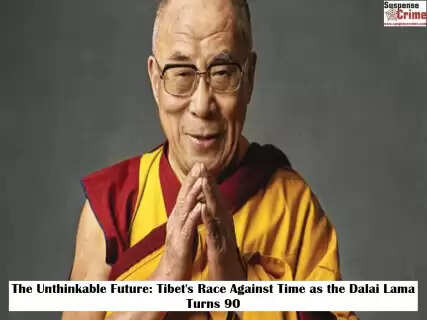
Suspense crime, Digital Desk : For decades, the 14th Dalai Lama has been the spiritual anchor and unwavering symbol of hope for the Tibetan people. But as he approaches his 90th birthday, a deepening shadow of uncertainty is falling over his global community of followers, who are now forced to confront an unthinkable question: what happens to Tibet without him?This is not merely a question of succession; it is an existential crisis for the Tibetan identity and its six-decade-long struggle against Chinese rule. The Dalai Lama is more than a spiritual leader; he is the unifying force and the world's most recognizable face of the Tibetan cause. His looming milestone has intensified anxieties about the future, especially with Beijing waiting in the wings to execute its political endgame.The Succession Crisis and China's EndgameThe Chinese government, which views the Dalai Lama as a separatist threat, has made its intentions clear: it plans to interfere directly in the succession process and install its own, state-sanctioned "15th Dalai Lama." This move is aimed at crushing the Tibetan freedom movement from within, co-opting its most sacred tradition to legitimize Chinese control over Tibet.This creates a high-stakes race against time for the Tibetan government-in-exile, based in Dharamshala, India. They face the daunting prospect of a "two Dalai Lamas" scenario—one recognized by the Tibetan people and the international community, and another imposed by Beijing, which would sow confusion and division.The Dalai Lama himself has spoken about several possibilities for his succession, adding to the complexity:Traditional Reincarnation: The search for a child who is his reborn soul, a process steeped in mystical signs and rituals.Appointment: Choosing a successor before his death, an "emanation" who would carry on his legacy.The End of the Institution: He has even suggested that he could be the last Dalai Lama, ending a tradition that has spanned centuries if the Tibetan people feel it is no longer necessary.A Community on EdgeFor Tibetans, the idea of a future without their leader is terrifying. In the streets of Dharamshala, prayers for his long life are constant. Many fear that without his unifying presence and global moral authority, their movement could fracture and lose the international attention he has so skillfully commanded.The international community is also taking note. The United States recently passed the "Resolve Tibet Act," which states that only the Tibetan Buddhist community has the right to choose the next Dalai Lama, free from interference by the Chinese government.Ultimately, as the Dalai Lama prepares to turn 90, the Tibetan people are bracing for the most critical juncture in their modern history. Their challenge is to preserve a sacred spiritual legacy and a political struggle for freedom, all while a powerful adversary seeks to hijack their very identity.
Around the web

